20 May 2025
How to create a CV using AI
Pros and cons of using AI tools to create your CV, explained simply.
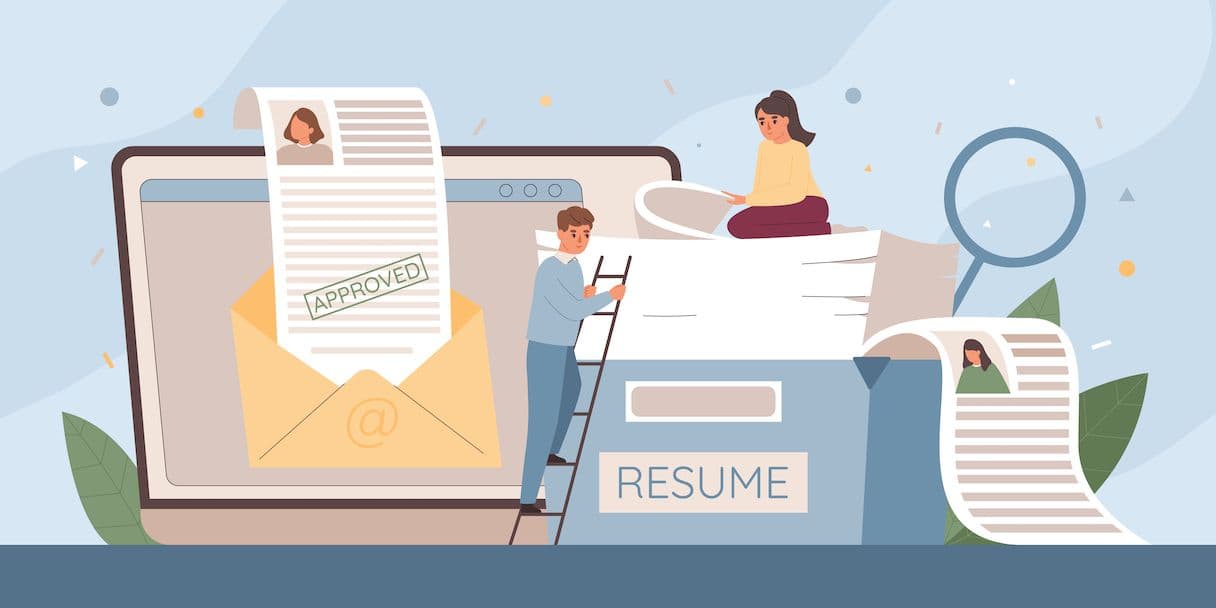
Table of contents
How to create a CV using AI
Why writing a CV feels so hard
How AI could help you write your CV
Research using AI
Writing your CV
Formatting and templates
If I use AI – will potential employers know? And does it matter?
How to make AI CV content sound human
Should you use an AI detector?
Do employers use AI detectors?
Beyond the CV – using AI for interview practice
Conclusion
How to create a CV using AI
Anyone who’s ever written a CV will tell you one thing: it’s hard.
Partly because writing about yourself, especially if you’re not used to doing it, is nearly always hard, and guaranteed to set off self-doubt demons you didn’t even know you had.
Partly because it’s tough to know what to include, and where. Do you include every job you’ve ever had, even your student bar job 20 years ago? If you include hobbies, does that make you look like a well-rounded person, or like you’re trying to pad out your CV?
And – this is the big one – partly because it’s just so laborious.
Why writing a CV feels so hard
Most of us only job hunt seriously every few years, so you never really get enough practice in CV writing to feel confident. It nearly always takes longer than you think it will, and it nearly always feels like more of a chore than it should.
Then, despite all your hard work, you often end up still feeling unsure whether the CV you’ve produced is good enough to get you an interview…
This is where an AI can help, if you know how to use it wisely.
It’s not a magic bullet, and you won’t be able to just push a button and have a perfect, interview-winning CV written for you. But it is an incredibly useful tool that could:
- 1Get you past the horrible blank page syndrome, where it’s hard to even start because you don’t know what to write.
- 2Research your sector and role far quicker than you could working manually, and tailor your CV accordingly.
- 3Help you analyse your own skills, and match them to the requirements in the job description.
- 4Help you customise your CV to the role you’re applying for, saving you time as well as meaning that you don’t need to
- 5Identify keywords that your prospective employers might be looking for.
- 6Write well-structured CV content ready for you to edit and personalise.
Note, though, that we did say ‘could’. It’s important to make sure you choose the right AI for you, as they have varying capabilities, and many come with costs attached. You can create a CV with Chat GPT, and this is many job hunters’ first port of call (especially for research), but you’ll find specialist AI CV makers could be a better choice when it comes to writing.
We’ll go into that more later – but for now, let’s look in more detail at exactly what AI could do to help you write your CV.
How AI could help you write your CV
AI CV makers tend to work in fairly similar ways to each other: you input information about you, your career, your qualifications and your skills…and the CV builder creates content for you to edit and refine.
It’s important to think of it as a 3 step process:
- 1Feeding the AI information
- 2Seeing what the AI provides
- 3Turning your AI draft into a polished, employer-ready CV
AI doesn’t (and can’t) do the job without you. In other words, what you’ll get out (even from the best AI CV builders), is dependent on what you put in.
Now, let’s look in more detail at exactly how AI could help you write your CV.
Research using AI
Before you even get to the point of writing your CV, it pays to know more about your prospective employers, where to find them and what they’re looking for.
This can be especially useful if you’re looking to move into a new sector, a higher level role or you’re looking for your first job out of university or college. You don’t necessarily need a specialist tool for this – AI chatbots like Chat GPT or Microsoft CoPilot will help.
For example, you could ask your chatbot a question like:
“I’m a new graduate with a degree in economics. I’m looking to apply for graduate roles in finance or related fields. What skills, soft skills and qualifications are graduate employers in this sector looking for?”
Here’s an example of what you might get back in response:
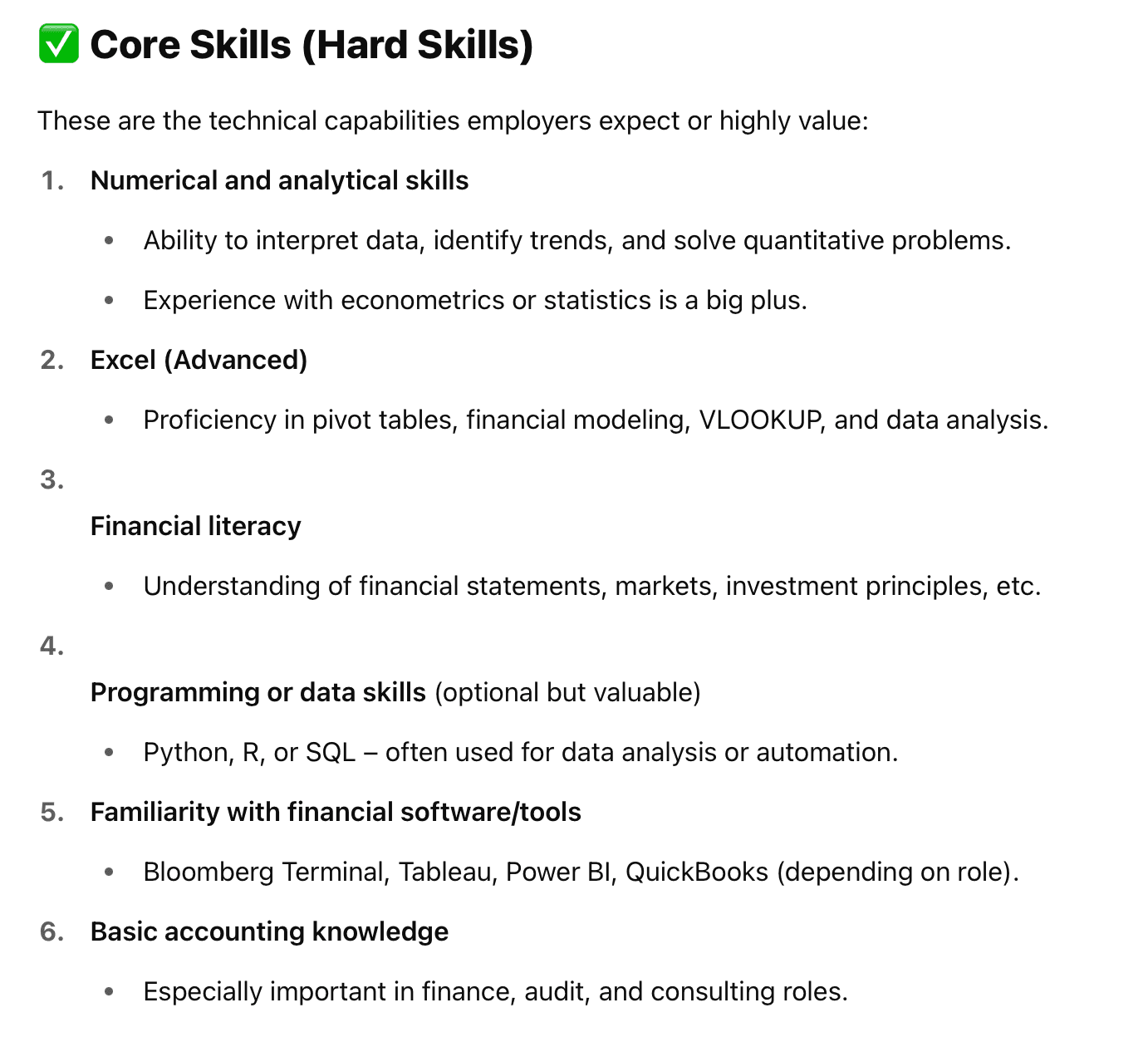
Or one like this:
“I’m a senior graphic designer with 10 years of experience working at a marketing agency. I want to move into a generalist marketing manager or director role. Please provide examples of potential employers and the skills and experience they would be looking for”
Here’s an example of what you might get back in response:
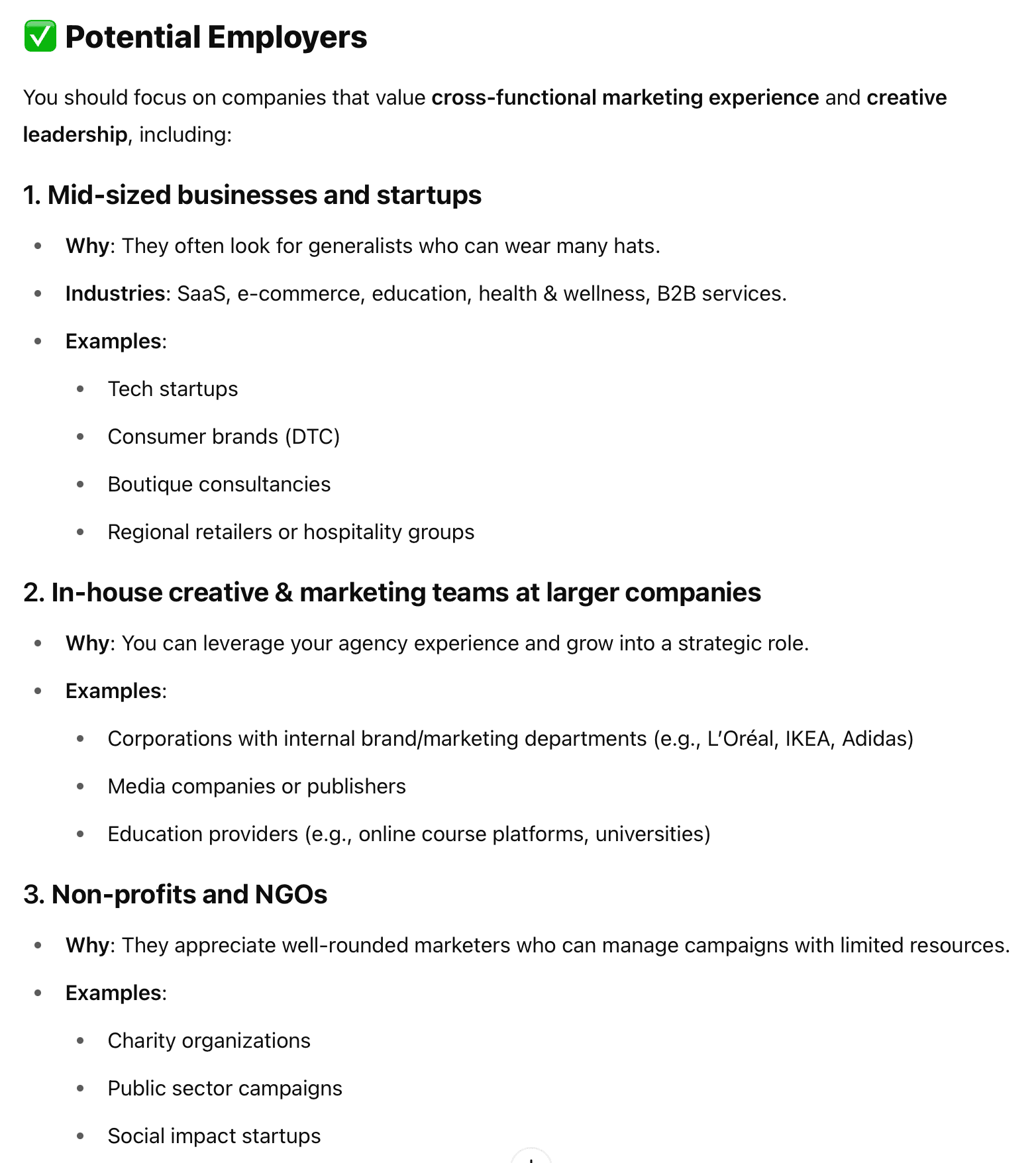
This is the fun bit! Use the AI to develop your ideas and knowledge, and keep asking more detailed questions to get it to go deeper.
You might find that some of the answers it gives you initially are quite broad or generic – if so, keep asking more specific and detailed questions until you get what you need. The beauty of this is that, since it’s not a person, it won’t get offended if you tell it you need more.
You can also use chatbots to ask questions about:
- Where to look for job vacancies in your sector or area
- Specific employers and what they look for
- What CV formats are best for your sector or role
- Potential interview questions
If you have a question related to your CV or job search, you can pretty much guarantee that AI can help, at least in some way.
Writing your CV
Once you have a job you want to apply for, it’s time to use AI to help you with the nitty gritty of writing your CV and getting your application sent off.
This is where dedicated AI CV builders can help you create a resume tailored to the role you’re applying for – and they can do it much quicker than you could working alone.
Again, the more you are willing and able to give the AI, the more you’re likely to get back from it.
If you provide the AI with only thin or basic details, it will come back with content that doesn’t properly show off your skills. But if you’re willing to put in just a little time to tell it about you, you’ll get back a tailored CV that you can simply edit and polish.
If you already have a CV that you want to improve, you could start by simply copying and pasting the content into an AI CV builder and seeing what it does with it. In fact, this might be one of the easiest ways to start.
Alternatively, you can allow the AI CV maker to do much more of the work. Exactly how this works depends on which CV creator you choose to use. Our CV builder at CV Wisely will allow you to simply put in basic information such as your job title, and it’ll come back with a draft paragraph of CV content.
Now, obviously, at this point, it’s completely generic. If all you’ve told the artifical intelligence is that you’re a ‘marketing director’, then that’s all it knows – but it can still come up with content that’s a great starting point for you to personalise.
Here’s what I get when I simply add ‘marketing director’ to the position field, and then ask the AI to draft a profile:
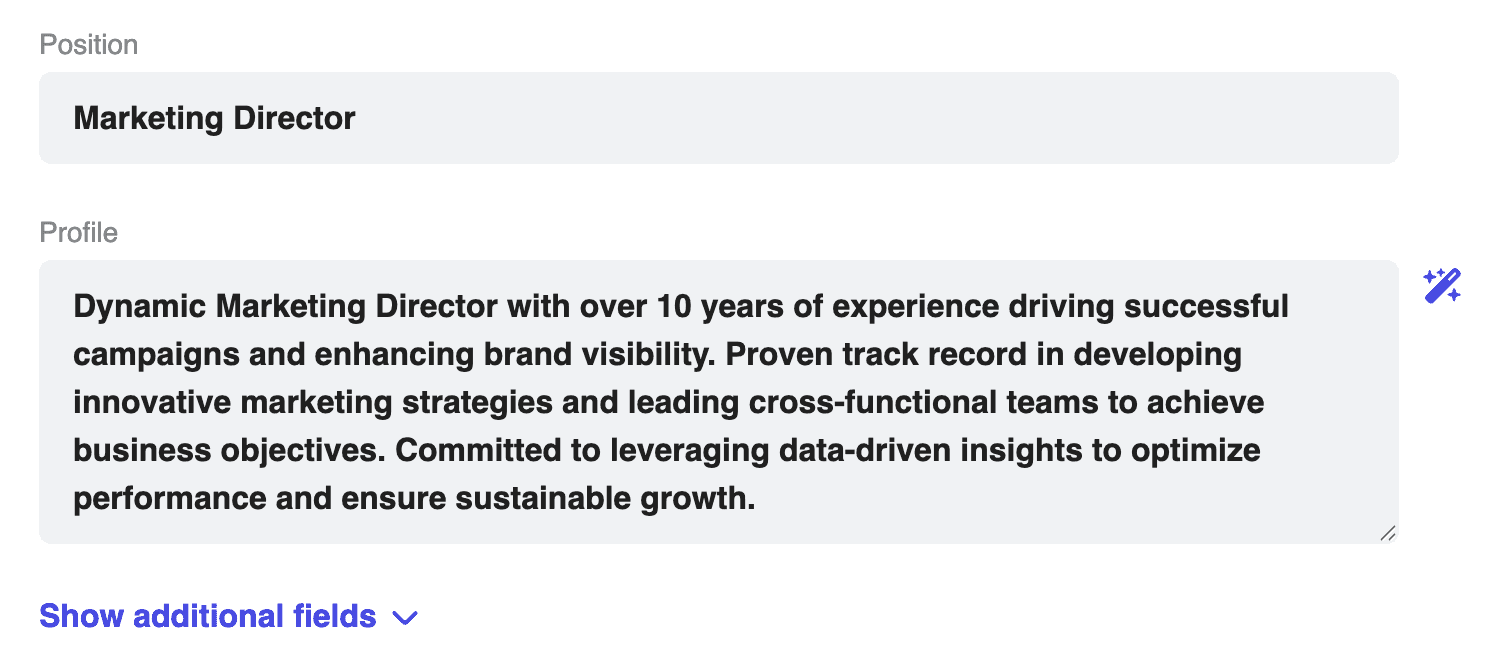
Now, I haven’t told the AI that I have experience ‘leading cross-functional teams’ or ‘delivering measurable results’ but if I were a marketing director, the chances are, these are things I would have done.
Let’s try it again with a different job title – IT project manager:
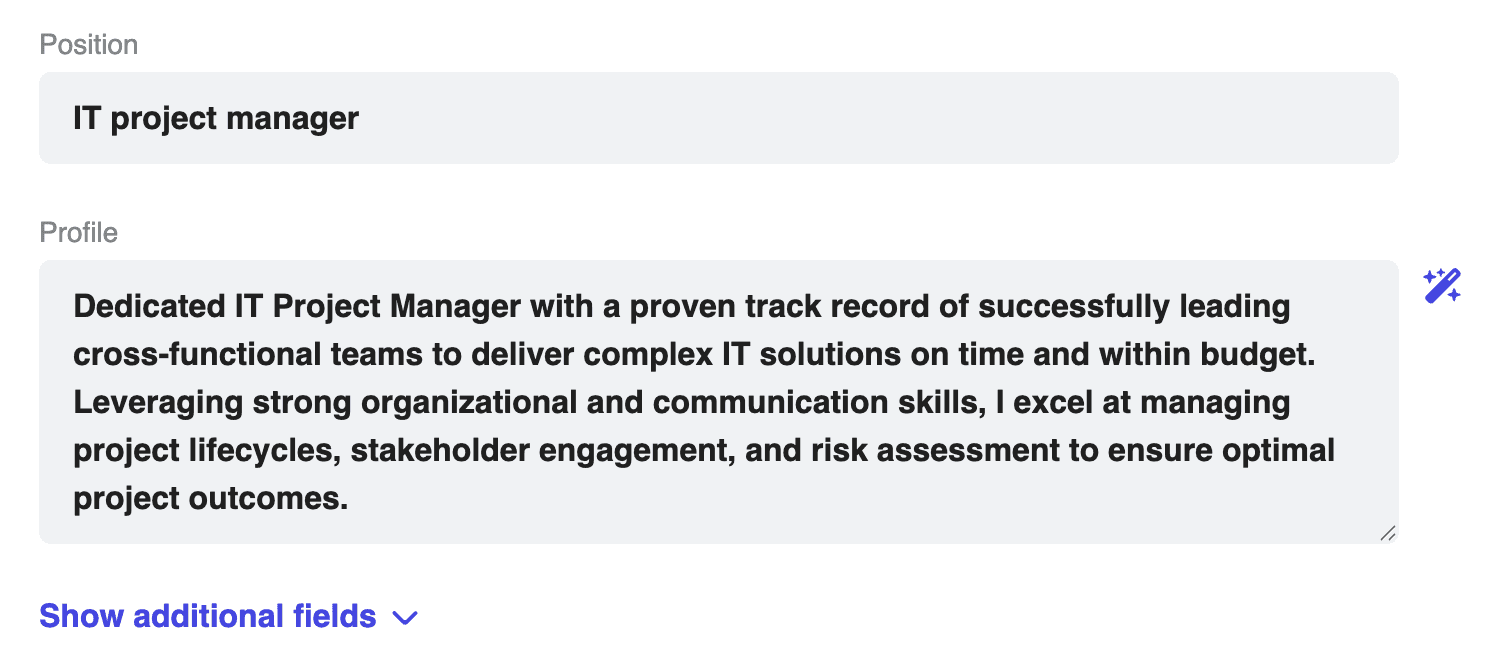
This time, the AI has taken a guess at a very specific detail – over 5 years of experience. That’s because it knows that most IT project managers will have that level of experience, and it also knows that they’ll know how to use ‘Agile methodologies’.
In both these cases, AI is drawing from the vast knowledge of the internet to make assumptions about you and your experience.
It’s then up to you to edit it and make it your own. So, if you have 10 years experience as a project manager, you change that. If you have a specific result you can point to as a marketing director (rather than just saying ‘delivering measurable results’), you can highlight this.
And remember – these are drafts created with just the job title. You can, instead, add much more detail so that the AI has to guess less and can come up with a more accurate profile. This might include details of particular skills you have, your educational background, and details of previous employment and achievements.
Formatting and templates
As well as the actual content of your CV, AI CV builders can usually help you format your CV so that it stands out and looks professional.
At CV Wisely, you can choose from a range of CV templates, some of them targeted at particular industries.
For example, our ‘Creative’ template is ideal for designers and other creative professionals.
Though templates like this aren’t strictly ‘AI’, they are a very simple, one-click solution to creating your CV. You simply input your content with the help of AI into each section, and then have the tool turn it into a finished, formatted CV.
If I use AI – will potential employers know? And does it matter?
Many job applicants worry that if they use AI to help create their CV, employers will know and instantly want to bin their application.
And if you’re worried about this, you should be – because for all that AI might save you a lot of time and frustration when putting together your CV, there’s really no point at all in applying for a job if you’re likely to fall at the first hurdle.
According to HR Magazine, 80% of employers reject ‘AI-assisted CVs’ outright.
That’s a pretty worrying statistic, and might be enough to make you think it’s not worth using AI at all. However, it’s important again to note that if you use AI as your starting point, rather than your end point, there’s no reason employers will know you used it.
The article above doesn’t specify what criteria employers who reject AI CVs use, but it’s likely that many of them are doing so because of obviously AI-generated language.
And anyone who’s used Chat GPT a few times will know that it’s pretty easy to spot.
Another problem for some employers is that AI means they receive increasingly large numbers of applications
Partly because AI makes it easier and quicker for people to apply. One survey of graduate employers showed that they’d seen a 500% increase in applications over the last year. Which means, of course, that it’s doubly important to make sure your CV stands out from the crowd (however you create it).
Even more concerning for some employers is that some applicants use AI to create CVs that don’t actually reflect their skills and experience. This article talks about this phenomenon in relation to the tech industry, stating that employers can receive AI-written CVs that completely make up skills and experience. Now, that sounds pretty crazy, and rather pointless – as it’ll quickly become obvious when you start a job that you don’t have the skills you say you do.
However – even if you know you’d never do this, it does create a problem for the rest of us. If employers are regularly receiving CVs that aren’t just generic, but actually fake, they’re going to get pretty cynical, pretty fast.
The upside?
If you can create a CV that is clearly thoughtful, well-written and unique, you’ll stand out immediately.
And if your CV is all of those things, it’s really unlikely that employers will care whether you had some help from AI to write your first draft.
Some important things to remember to make sure your CV doesn’t look like AI:
- Everyone else who’s applying for a job has access to the exact same AI tools and CV builders as you do. And those AI tools draw their information from the internet. Inevitably, this means that your unedited AI-written IT project manager CV is likely to sound very similar to the next applicant’s unedited AI-written IT project manager CV.
- AI can get things wrong. Not just a little bit wrong – AI is capable of completely making up ‘facts’ and sources, a phenomenon often known as ‘hallucinating’. Now, this shouldn’t be a problem for you if you’re using AI to create a CV based on your own experiences and skills, but it’s certainly worth remembering if you use AI to research employers or industries.
- When you edit your AI CV content, you need to do 2 things. First, make sure it’s personalised and truly shows off your best skills and experience. Second, make sure it sounds human.
How to make AI CV content sound human
You’ve no doubt seen this advice before: make sure your AI content sounds warm and human, not cold and robotic. But what does this actually mean in practice, and how can you do it?
It’s often pretty easy to spot unedited AI content. You may not be able to put your finger on why, but it just feels a bit ‘off’. This is because AI doesn’t really know you, and (unless you spend lots of time training it to write in your voice, which is a whole other topic), it can’t sound like you.
AI, naturally enough, reverts to generic rules and sentence structures. You might have noticed that AI often:
- Sounds more formal than content you’d write yourself, using phrases like ‘In addition to’ or ‘In the realm of’. You’ll probably find these used less often in dedicated CV writing tools, but you might find that Chat GPT and similar generic tools default to them often.
- Makes bold claims without backing them up. For example, you might find it tells you that you’re ‘highly experienced’ or ‘extremely passionate’ without giving examples. Of course, human-written CVs can often contain these kinds of claims too, but whether they’re down to AI or humans, employers are likely to find them frustrating to see.
- Overuses buzzwords, or words that sound like buzzwords when they’re used without the right context. For example, the marketing director profile example we gave earlier included ‘optimising campaigns’.
- And for a good reason, as that’s something that most marketing directors will do – but employer will instantly want to know ‘what kind of campaigns?’ and ‘what kind of optimisation?’. You should see phrases like this as prompts for you to expand on and add concrete examples to.
- Uses too many words. AI is often not a concise writer, and while it can sound impressive at first read, once you read it again, you’ll notice that it’s using a lot of words to say not very much. This, in turn, can lead to an over-long, waffly CV – and that’s going to send you to the bottom of any busy employer’s rejection pile pretty fast.
- Is devoid of personality. Employers with hundreds of applications to sift through don’t just want to see what you’ve done and what education you have. They want to start to see a bit of ‘you’ coming through.
This is especially true of your cover letter, but it’s also true of your CV. It matters less for technical roles, but for others it’s really important, including creative roles, those where communication is especially vital, or graduate roles where most applicants have similar past experience.
Should you use an AI detector?
In a word – no. Or at least, you shouldn’t regard them as a reliable way to see if your CV looks like it was written with AI.
AI detectors are notoriously unreliable, and are known to flag human-written content as AI, and AI content as human-written. Essentially, if you think your CV sounds too AI, then it probably does, and you should do a bit more editing.
Do employers use AI detectors?
There’s no strong evidence that they do, though we know detectors are increasingly used by universities, for example, to check student papers.
Employers can generally ‘just tell’ when they receive an unedited (or poorly edited) AI CV. 74% say they can spot when AI has been used, and many will reject applications that they believe are AI written.
None of this means that you shouldn’t use AI.
AI has the potential to help you create a well-structured, clearly formatted, interesting CV that will show off your skills and get you interviews. But, as we’ve now made pretty clear, no AI CV builder can do this for you – the magic is all in the editing.
Beyond the CV – using AI for interview practice
You send off your well-crafted, AI-assisted CV, and you get an interview. So then what?
Artificial intelligence can be a huge help at this stage of the job application process too, helping show you what interview questions you might come up against, and confirming exactly what your potential employer might be looking for from you.
If you used AI to help you research employers and roles (as we outlined earlier), you’ll already have an idea of how this works.
To get help with interviews, you could give Chat GPT a prompt like:
‘Please analyse the following job description [add job description] for [role] in [industry] and create a list of commonly asked interview questions’.
This gives you a great base to prepare from. If you’ve ever sat there the night before an interview racking your brains for questions to prepare for, you’ll know how useful this might be.
But, as ever, bear in mind that artificial intelligence is only ever going to be able to guide you.
It doesn’t actually know what you’ll be asked, and so it’s always worth doing some thinking and research of your own. Prep for any interview questions you can identify, not just those that Chat GPT can identify for you.
Another really helpful use of AI is Chat GPT’s voice mode.
You can use this to practice model answers to potential interview questions, and get instant feedback on how you sound. Of course, this isn’t a true substitute for real, human feedback, but it might just be less embarrassing than asking a friend to practice with you.
Conclusion
If you’ve ever wondered how to create a CV with AI, hopefully you now know that creating a first draft of your CV with AI is incredibly easy (especially if you use a dedicated AI resume builder like CV Wisely.
Using artificial intelligence to create your CV means you can:
- 1Get away from CV-writer’s block
- 2Get quick suggestions on what to write and what sections to include
- 3Have your CV fully formatted for you
But (isn’t there always a but?) – it can’t do the whole job for you.
Employers hate CVs that look like you’ve put little effort in. If it looks like all you’ve done is click a few buttons, they’ll make an assumption that you’re lazy or that you don’t know how to communicate well.
Make AI your CV-writing starting point. Get it to create a first draft, edit, get feedback, polish and personalise. That way, you’ll get all the benefits of AI in saving you time and giving you prompts, while creating a unique, professional CV that gets you to the top of the ‘interview’ pile.
Alice Cuninghame is a copywriter and strategist from Brighton, UK. She’s focused on helping businesses create profitable connections, based on data and storytelling. Since 2010, she’s worked with a few household names, but her real strength lies in supporting startups and scaleups to reach their full potential. When she’s not doing that, she’s usually on the beach or in the woods near her 2 young sons, or checking out a band or spoken word night.
Can AI write a complete CV for me?
What’s the best AI tool for creating a CV?
Will employers know if I used AI to create my CV?
Is it safe to rely on AI for job applications?
How can I make my AI-written CV sound more human?
What should I input into an AI CV builder for best results?
Can AI help with interview preparation too?
© 2026 CV Wisely, All Rights Reserved